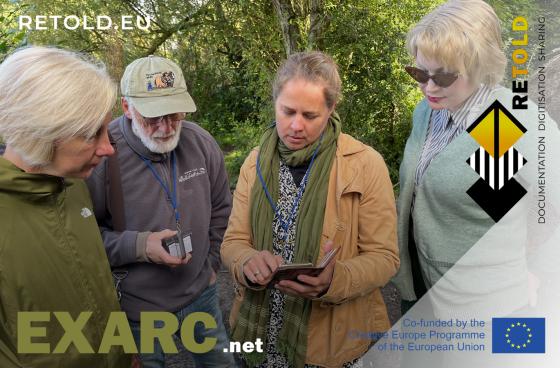RETOLD: Testing and Dissemination

The RETOLD conference in Lelystad, September 2024, counted three days. Over the first two days, a large number of papers were presented, which can be found here. On the third day of the RETOLD conference we took all the participants to our nearby testing grounds: the archaeological open-air museum Swifterkamp. Following the introduction in RETOLD, we could test it “in the wild”. For this purpose, we linked RETOLD partners with other conference participants, most of which are museum professionals. The group also included a gaming specialist and a few others with a non-museum background.
A key output of the RETOLD project is a manual, showing features of the system, which can be tested as well - https://retold.eu/features. This is to share the logic and strategies for conducting a self study of digital data collection in one’s own organisation. This manual, along with other project resources, is located on the RETOLD website where museum professionals and members of the public can access those for free. We intend to encourage a wide audience of museum professionals and members of the public to learn about RETOLD and then implement the recommended best practices.
The two-day introduction, also included presentations on what can be done when all the information is digital and properly structured. Starting the third day, participants were eager to get going. We divided the group in three, under the guidance of the RETOLD museum partners, and we tested the documentation form of the buildings at the Swifterkamp Stone Age Open-Air Museum. We intended to collect as many comments as possible, but also check how well it is understood, and what was still missing. We used the forms as presented at the RETOLD website, and collected all questions and suggestions which popped up. It was particularly important to have remarks and opinions from people with a technical / game / app design background and those who already manage databases with information on houses or crafts. Everybody was very enthusiastic and the atmosphere was really good.
While discussing in the afternoon we arrived at the conclusion that having a Progressive Web App (PWA) instead of a classic app, is the better solution for future developments. PWA’s evolved very fast. For example, with responsive design you can make it fit for a mobile or tablet. Apps can be more custom made, but right now, that is not needed. Having options for exporting and importing data is also interesting, but mainly for researchers, while the staff museum is keen on having a more visual approach.
We also discussed the crafts and craftsperson, showing the possibilities, and how we can actually connect these entities to others in the future. As documenting a craft as such is complicated, we emphasised on documenting the specific event of a craft with a specific craftsperson. That approach was quite new to the participants, but they did see the potential of linking the information between craftspersons and craft activities in a more engaged way.
As sharing the manual and features of the RETOLD system is our main concern now, these days proved that we are on the right path, and we definitely need to continue with it. Our participants returned home with a strong wish to test it further at their own museums. For this purpose, we distributed a simple RETOLD information folder which these colleagues will share again.
